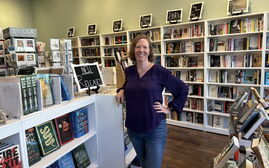
Processing Your Payment
Please do not leave this page until complete. This can take a few moments.
- News
-
Editions
-
- Lists
-
Viewpoints
-
Our Events
-
Event Info
- Women's Leadership Forum 2025
- On the Road with Mainebiz in Bethel
- Health Care Forum 2025
- On The Road with Mainebiz in Greenville
- On The Road with Mainebiz in Waterville
- Small Business Forum 2025
- Outstanding Women in Business Reception 2025
- On The Road with Mainebiz in Bath
- 60 Ideas in 60 Minutes Portland 2025
- 40 Under 40 Awards Reception 2025
- On The Road with Mainebiz in Lewiston / Auburn
- 60 Ideas in 60 Minutes Bangor 2025
Award Honorees
- 2025 Business Leaders of the Year
- 2024 Women to Watch Honorees
- 2024 Business Leaders of the Year
- 2023 NextUp: 40 Under 40 Honorees
- 2023 Women to Watch Honorees
- 2023 Business Leaders of the Year
- 2022 NextUp: 40 Under 40 Honorees
- 2022 Women to Watch Honorees
- 2022 Business Leaders of the Year
-
-
Calendar
-
Biz Marketplace
- News
- Editions
- Lists
- Viewpoints
-
Our Events
Event Info
- View all Events
- Women's Leadership Forum 2025
- On the Road with Mainebiz in Bethel
- Health Care Forum 2025
- On The Road with Mainebiz in Greenville
- On The Road with Mainebiz in Waterville
- + More
Award Honorees
- 2025 Business Leaders of the Year
- 2024 Women to Watch Honorees
- 2024 Business Leaders of the Year
- 2023 NextUp: 40 Under 40 Honorees
- 2023 Women to Watch Honorees
- 2023 Business Leaders of the Year
- + More
- 2022 NextUp: 40 Under 40 Honorees
- 2022 Women to Watch Honorees
- 2022 Business Leaders of the Year
- Nomination Forms
- Calendar
- Biz Marketplace
Colby's new AI director may spark a new kind of liberal learning
There’s much that is new about Colby College’s newly named director of the Davis Institute for Artificial Intelligence.
Amanda Stent, formerly an AI architect with Bloomberg LP, will take on the Colby role in October, the Waterville college announced. The institute itself will be new this fall, launching with the help of a $30 million gift from the family and charitable foundation of 1985 graduate Andrew Davis.

And the institute may fulfill a new role: bringing the perspective of a liberal arts college to AI, traditionally a realm of huge research universities.
Business blend
Colby is the first college to create a cross-disciplinary organization focused on AI, or machine learning, the school said in February.
Stent brings to her role a similarly diverse background. Working in both business and academia, she’s considered a leading authority on natural language processing, the branch of AI that allows computers to understand human text and spoken words.
In addition to leading Bloomberg’s People and Language AI Team, she has served as principal research scientist and research director at Yahoo Labs, and conducted research on dialogue systems and assistive technology for AT&T Inc.
Before joining the private sector, Stent was a tenured associate professor of computer science at Stony Brook University, where she created an interdisciplinary computational linguistics program and taught courses in natural language processing and information retrieval. She is a member of the National Academy of Sciences’ working group on responsible computing research and co-author of “The Princess at the Keyboard: Why Girls Should Become Computer Scientists.”
Stent is a co-inventor on more than 30 patents related to natural language processing. She holds a Ph.D. in computer science from the University of Rochester and a B.A. in mathematics from Houghton College.
“Amanda is the ideal person to build and lead the Davis Institute for Artificial Intelligence,” Colby President David A. Greene said in a news release last week. “She is in the midst of a distinguished career overseeing large, complex teams of scientists, developing new technologies, and addressing algorithmic bias in machine learning. But she is a teacher and researcher at heart.
“She will establish the Davis Institute as a global model for how liberal arts colleges can shape the future of AI for the common good.”
Apply liberally
The use of AI influences almost all industries, and entire industries have been built around it.
In May, a global research firm predicted the AI market size to mushroom from $58 billion this year to $310 billion by 2026, at a compound annual growth rate of 39.7%. Among the drivers of growth is the COVID-19 pandemic, which has accelerated the adoption of AI tools in health care and other sectors. Technology giants such as Microsoft, Google, Apple, Amazon and Facebook are all in.
Since the term “artificial intelligence” was coined in 1956, much of the research and development around machine learning has taken place within the labs of government agencies and universities such as the Massachusetts Institute of Technology.
Since 2020, the U.S. National Science Foundation has invested $220 million in NSF National Artificial Intelligence Research Institutes, nearly all of which are sited at major universities. The institutes and their partners operate in 40 states. Maine is not one of them.
But the Davis Institute at Colby may fill a different role.
In a February interview with National Public Radio about the institute, Greene said, “I think that we need to have a whole cohort of students from different backgrounds and experiences who are really leading AI and not being led by it. So one of the beauties of people who are trained in the liberal arts is that they really understand how to come at a problem from multiple, different angles.
“I think the more that we have people who are coming from liberal arts backgrounds, who are really raising the kind of questions that will ultimately shape AI in more positive ways, the better off we’ll be.”
Stent, in the news release, commented: “Being at Colby will give me the opportunity to work with students and faculty across disciplines to not only use AI to inform those disciplines but ensure that all of those disciplines inform AI.
“AI will continue to have broad and profound societal impact, which means that the whole of society should have a say in what we do with it. For that to happen, each of us needs to have a foundational understanding of the nature of this technology.”













0 Comments